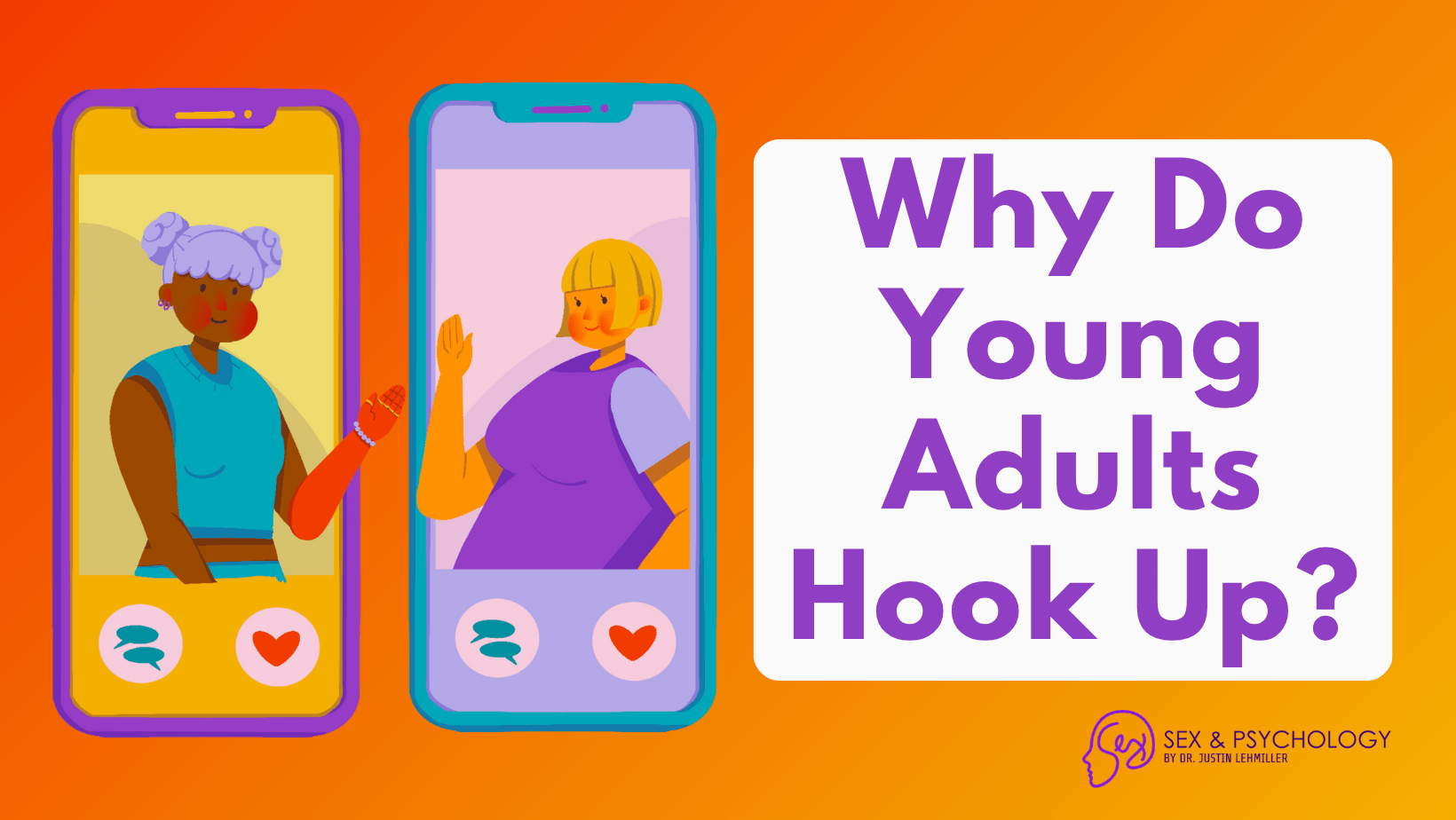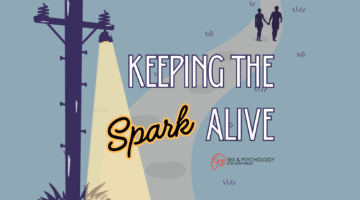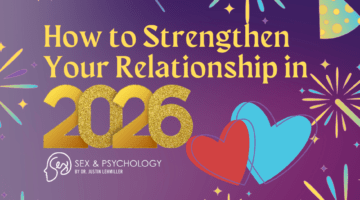Why Do Young Adults Hook Up?
July 9, 2025 by Emily Mendelson
Casual sexual encounters between people we are not romantically involved are often referred to as “hookups.” Most of the research on hookups—also known as one-night stands, booty calls, and friends with benefits—has focused on young adults and college students, who are often described as living in a “hookup culture.” In this post, we’re going to look at some of the research that explores why young people hook up, as well as a study that seeks to broaden our view of hookup culture itself.
Defining Hookup Culture
Early research on hookup culture emerged from the need to define cultural shifts in how people approach dating. [1] Whereas traditional “dating” used to serve as an inroads for sexual activity after a certain period of courtship, hookups bypass these courtship rituals and don’t require an explicit romantic connection. Hookup partners can be strangers, friends, or even colleagues, as long as the other person is not a committed romantic partner. Hookups can involve a number of different sexual activities, but oftentimes include kissing and some form of genital stimulation. [1]
“Hookup culture” research comes primarily from the experiences of college students. Many factors of college life, such as living in close proximity to others who are similar in age (like living in dorms), frequent partying, and easy access to alcohol all thought to promote an environment that facilitates casual sex. But what do young people say actually motivates them to hook-up?
Motivations to Hook-Up
The Hookup Motives Questionnaire [2] was originally published as a way to better understand the reasons that college students hook up with one another. Over 700 students were asked to rate the extent to which they agreed with a number of different possible motivations for hooking up, and their scores indicated five key reasons for doing so. These included social-sexual reasons (to have multiple sexual partners, to gain sexual benefits), social-relationship reasons (to develop a relationship, to form an emotional bond), enhancement reasons (it’s fun, pleasurable, and exciting), coping reasons (to feel better, to cheer up), and conformity reasons (to fit it, to avoid being left out). In this study, enhancement was the most highly-rated reason to hook up with others. [2]
A more recent study of almost 300 college students found that, on average, social-sexual motives were rated most highly in terms of why individuals hook-up, followed by coping motives. [3] This suggests a potential shift in the primary reason to hook-up over the years: from hooking-up because it is fun to hooking-up for sexual benefits and/or to cope with negative emotions.
This study also sought to test the association between how positive or negative hookup experiences might be related to individuals’ motivations to hook-up in the first place. The researchers found that hooking up for enhancement reasons, social-sexual reasons, and social-relationship reasons were all associated with positive hookup experiences. Hooking up to conform with others, however, was not associated with positive outcomes. This suggests that while hookups may be seen as useful relationship-building tools, they are not necessarily effective in helping people to fit in.
Expanding our Understanding of Hookup Culture
So far, the research we’ve discussed has focused primarily on the experiences of heterosexual college students. However, a recent study sought to investigate whether these motivations were applicable to LGBTQ+ individuals as well. [4] In this study, the 51 participants were college students (across three campuses) who all identified as queer in some way. Specifically, 20% of the sample identified as something other than cisgender (e.g, trans, nonbinary), 27% of participants identified as gay, and 25% of participants identified as bisexual. Instead of administering a survey, the researchers interviewed participants about their experiences with hooking up so that individuals were not limited to a predetermined set of motivations when discussing their reasons for hooking up with others.
The researchers found that although there were many similarities in the motivations these participants described to those on the Hookup Motives Questionnaire, there were also some unique reasons that emerged. Some of the similarities included hooking up for one’s own pleasure (social-sexual reasons), because it is exciting and fun (enhancement reasons), and because it’s nice to be physically close to other people. Hooking-up was also a way that some LGBTQ+ individuals said they develop dating relationships, as well as way to cope with negative emotions like stress and depression.
In terms of differences, a unique finding from this study is that LGBTQ+ people hook-up not just for their own pleasure, but to provide pleasure to a sexual partner as well. In addition, while coping as a motivation has been previously identified, there is a specific aspect of self-affirmation that appears to be important for LGBTQ+ young adults when hooking-up with others. For some, hookups serve as a way to “feel sexually validated” (p. 138), which may be particularly important in strengthening one’s own queer identity. Lastly, participants described their motivations to hook-up with others as changing over time, such as evolving from hooking-up due to boredom to eventually hooking up to find a romantic partner. [4]
Taken altogether, there are a number of reasons that young adults hook-up with others, but some of the most common motives today may be in order to build intimate connections and for pleasure, whether that be sexual pleasure or excitement about a new experience. However, there is always room for more work to be done when it comes to exploring the many facets of casual sex, especially as it occurs beyond college campuses.
If you have a sex question of your own, record a voicemail at speakpipe.com/sexandpsychology to have it answered on the blog or the podcast.
Want to learn more about Sex and Psychology? Click here for more from the blog or here to listen to the podcast. Follow Sex and Psychology on Facebook, Twitter (@JustinLehmiller), Bluesky, or Reddit to receive updates. You can also follow Dr. Lehmiller on YouTube and Instagram.
Title graphic made with Canva.
References
[1] Garcia, J. R., Reiber, C., Massey, S. G., & Merriwether, A. M. (2012). Sexual hookup culture: A review. Review of General Psychology, 16(2), 161–176. https://doi.org/10.1037/a0027911
[2] Kenney, S. R., Lac, A., Hummer, J. F., & LaBrie, J. W. (2014). Development and validation of the Hookup Motives Questionnaire (HMQ). Psychological Assessment, 26(4), 1127–1137. https://doi.org/10.1037/a0037131
[3] Hahlbeck, S. M., Hill, J. C., Ahrenholtz, R., & Hayden, M. (2022). College students’ hookup motivations as predictors of the positivity and negativity of their most recent hookup experience. Journal of American College Health, 70(8), 2392–2398. https://doi.org/10.1080/07448481.2020.1865378
[4] Snapp, S., Ching, T. H. W., Miranda-Ramirez, M. A., Gallik, C., Duenaz, U., & Watson, R. J. (2024). Queering hookup motives in a diverse sample of LGBTQ+ young adults. The Journal of Sex Research, 61(1), 133–143. https://doi.org/10.1080/00224499.2023.2183175

Dr. Justin Lehmiller
Founder & Owner of Sex and PsychologyDr. Justin Lehmiller is a social psychologist and Research Fellow at The Kinsey Institute. He runs the Sex and Psychology blog and podcast and is author of the popular book Tell Me What You Want. Dr. Lehmiller is an award-winning educator, and a prolific researcher who has published more than 50 academic works.
Read full bio >


